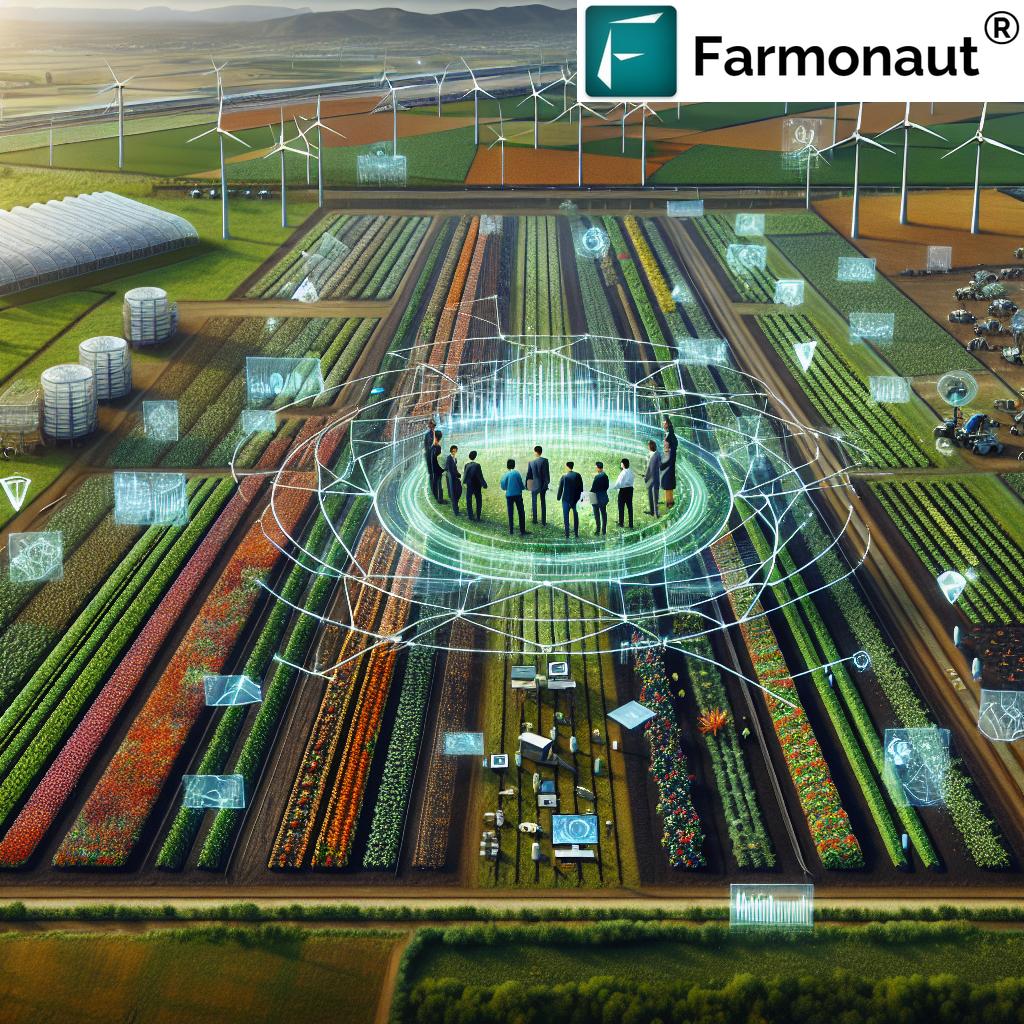Navigating AgriTech Innovation: Farm491’s Guide to Precision Farming and Sustainable Agriculture
“Farm491’s ‘Croissants & Questions’ series features expert discussions on carbon management and natural capital in agriculture.”
Welcome to Farm491’s comprehensive guide on agritech innovation and sustainable agriculture practices. As leaders in the field, we’re excited to share our insights on precision farming techniques and agricultural data analytics that are revolutionizing the way we approach farming. Our mission is to empower farmers and agricultural entrepreneurs with cutting-edge farm technology solutions that optimize crop monitoring and management while promoting sustainability.

The Rise of AgriTech Innovation
In recent years, we’ve witnessed a significant surge in agritech innovation, driven by the need for more efficient and sustainable farming practices. At Farm491, we’re at the forefront of this revolution, working closely with innovative companies like Farmonaut to bring the latest technologies to the agricultural sector.
Farmonaut, a pioneering agricultural technology company, offers advanced satellite-based farm management solutions through various platforms, including android, iOS, web/browser apps, and APIs. Their mission aligns perfectly with ours: to make precision agriculture affordable and accessible to farmers worldwide.
Key Technologies Driving AgriTech Innovation
- Satellite-Based Crop Health Monitoring: Utilizing multispectral satellite images to provide real-time insights into vegetation health, soil moisture levels, and other critical metrics.
- AI-Powered Advisory Systems: Delivering personalized farm advice and weather forecasts to optimize crop management strategies.
- Blockchain-Based Traceability: Ensuring transparency and security in agricultural supply chains from farm to consumer.
- Fleet and Resource Management: Optimizing vehicle usage and improving overall management of agricultural machinery.
- Carbon Footprinting: Tracking and reducing environmental impact through real-time emissions data.
These technologies are not just innovations; they’re transforming the agricultural landscape, making farming more precise, efficient, and sustainable.
Precision Farming Techniques: A Game-Changer for Agriculture
Precision farming is at the heart of modern agriculture, and it’s a field where we’ve seen tremendous growth and innovation. By leveraging data-driven insights and advanced technologies, farmers can make more informed decisions, leading to increased yields and reduced resource waste.
“Precision farming techniques and agricultural data analytics can increase crop yields by up to 20% while reducing water usage by 30%.”
Key Benefits of Precision Farming
- Optimized Resource Use: Precise application of water, fertilizers, and pesticides based on real-time data.
- Improved Crop Health: Early detection of diseases and pests through advanced monitoring systems.
- Increased Yields: Data-driven decision-making leads to better crop management and higher productivity.
- Reduced Environmental Impact: Minimized use of chemicals and water contributes to sustainable farming practices.
- Cost Efficiency: Better resource management results in lower operational costs for farmers.
At Farm491, we’re committed to helping farmers and agribusinesses adopt these precision farming techniques through our agribusiness incubator programs and partnerships with innovative companies like Farmonaut.
Sustainable Agriculture Practices: The Future of Farming
Sustainability is no longer just a buzzword; it’s a necessity in modern agriculture. As we face challenges like climate change and resource scarcity, adopting sustainable agriculture practices becomes crucial for the future of farming and global food security.
Key Sustainable Agriculture Practices
- Crop Rotation: Enhancing soil health and reducing pest pressures.
- Conservation Tillage: Minimizing soil disturbance to improve soil structure and reduce erosion.
- Integrated Pest Management: Using natural predators and targeted interventions to control pests.
- Water Conservation: Implementing efficient irrigation systems and water management techniques.
- Agroforestry: Integrating trees and shrubs into crop and animal farming systems.
These practices not only benefit the environment but also contribute to long-term farm productivity and profitability. At Farm491, we provide resources and support to help farmers transition to more sustainable methods.
Agricultural Data Analytics: Empowering Informed Decision-Making
In the era of big data, agricultural data analytics has emerged as a powerful tool for farmers and agribusinesses. By collecting and analyzing vast amounts of data from various sources, including satellite imagery, soil sensors, and weather stations, we can gain unprecedented insights into farm operations.
Applications of Agricultural Data Analytics
- Yield Prediction: Forecasting crop yields based on historical data and current conditions.
- Risk Management: Identifying potential risks and developing mitigation strategies.
- Resource Optimization: Determining the most efficient use of water, fertilizers, and other inputs.
- Market Analysis: Predicting market trends to inform planting and selling decisions.
- Performance Benchmarking: Comparing farm performance against industry standards and peers.
At Farm491, we work with partners like Farmonaut to provide farmers with access to powerful analytics tools that can transform raw data into actionable insights. These tools are essential for making informed decisions that can significantly impact farm productivity and profitability.
Explore Farmonaut’s Satellite API
Agribusiness Incubator Programs: Nurturing Agricultural Entrepreneurship
Innovation in agriculture often starts with bold ideas from entrepreneurs. Our agribusiness incubator programs at Farm491 are designed to nurture these ideas and help turn them into viable businesses in the smart farming sector.
Key Features of Our Incubator Programs
- Mentorship: Access to experienced professionals in agriculture and business.
- Networking: Opportunities to connect with industry leaders and potential investors.
- Resources: State-of-the-art facilities and technology for product development and testing.
- Funding Support: Guidance on accessing grants, loans, and investment opportunities.
- Business Development: Workshops and training on business planning, marketing, and scaling.
Through these programs, we aim to foster a new generation of agricultural entrepreneurs who will drive innovation and sustainability in the sector.

Smart Farming Technologies: The Future is Now
Smart farming technologies are revolutionizing agriculture by integrating information technology with farming practices. These technologies enable farmers to make more precise and efficient decisions about their operations.
Key Smart Farming Technologies
- IoT Sensors: Collecting real-time data on soil conditions, weather, and crop health.
- Automated Irrigation Systems: Optimizing water usage based on soil moisture and weather forecasts.
- Drones and Satellite Imagery: Providing aerial views for crop monitoring and mapping.
- Robotics: Automating tasks like harvesting and weeding for increased efficiency.
- AI and Machine Learning: Analyzing data to provide predictive insights and recommendations.
At Farm491, we’re committed to helping farmers and agribusinesses adopt these smart farming technologies through our resources, events, and partnerships with innovative companies like Farmonaut.
Check out Farmonaut’s API Developer Docs
Farm Management Software: Streamlining Operations
Effective farm management is crucial for success in modern agriculture. Farm management software provides a centralized platform for tracking and optimizing various aspects of farm operations.
Key Features of Farm Management Software
- Crop Planning: Scheduling planting, harvesting, and crop rotation.
- Inventory Management: Tracking inputs, equipment, and products.
- Financial Management: Budgeting, expense tracking, and financial reporting.
- Labor Management: Scheduling and tracking worker hours and tasks.
- Compliance Tracking: Ensuring adherence to regulatory requirements and certifications.
These software solutions can significantly improve operational efficiency and decision-making on farms of all sizes. At Farm491, we work with partners to provide access to cutting-edge farm management software that can transform how farms operate.
Crop Monitoring Systems: Ensuring Optimal Plant Health
Effective crop monitoring is essential for maximizing yields and minimizing losses. Advanced crop monitoring systems provide farmers with real-time insights into plant health, allowing for timely interventions and optimized crop management.
Key Components of Crop Monitoring Systems
- Remote Sensing: Using satellite and drone imagery to assess crop health over large areas.
- Ground Sensors: Monitoring soil moisture, temperature, and nutrient levels.
- Weather Stations: Providing localized weather data for informed decision-making.
- Disease and Pest Detection: Early identification of potential threats to crop health.
- Growth Stage Tracking: Monitoring crop development to optimize interventions.
At Farm491, we recognize the importance of effective crop monitoring in modern agriculture. We work with partners like Farmonaut to provide farmers with access to advanced crop monitoring systems that can significantly improve crop management and yields.
AgriTech Innovation Comparison Matrix
| Technology | Crop Yield Improvement | Resource Conservation | Environmental Impact | Cost Efficiency | Ease of Implementation |
|---|---|---|---|---|---|
| Satellite Imagery | ★★★★☆ | ★★★★★ | ★★★★☆ | ★★★☆☆ | ★★★★★ |
| IoT Sensors | ★★★★★ | ★★★★☆ | ★★★★☆ | ★★★☆☆ | ★★★☆☆ |
| AI-powered Analytics | ★★★★★ | ★★★★☆ | ★★★★☆ | ★★★★☆ | ★★★☆☆ |
| Drone Technology | ★★★★☆ | ★★★☆☆ | ★★★★☆ | ★★☆☆☆ | ★★★☆☆ |
| Smart Irrigation Systems | ★★★★☆ | ★★★★★ | ★★★★★ | ★★★★☆ | ★★★★☆ |
Joining Our Community of Innovators
At Farm491, we believe in the power of community and collaboration. Our thriving network of innovators, farmers, and industry experts is at the heart of our success in driving agritech innovation forward.
Benefits of Joining Our Community
- Knowledge Sharing: Access to the latest research and best practices in agritech.
- Networking Opportunities: Connect with like-minded innovators and potential collaborators.
- Event Participation: Attend industry-leading events like our “Croissants & Questions” series.
- Resource Access: Utilize our state-of-the-art facilities and technologies.
- Funding Opportunities: Stay informed about upcoming challenges, prizes, and funding options.
By joining our community, you’ll be at the forefront of agricultural innovation, helping to shape the future of farming.
Upcoming Events and Opportunities
We regularly host events and provide opportunities for our community members to learn, grow, and innovate. Here are some of our upcoming highlights:
- “Croissants & Questions” Series: Monthly discussions on pressing topics like carbon management and natural capital.
- AgriTech Innovation Challenge: An annual competition for startups to showcase their innovative solutions.
- Sustainable Farming Workshop: Hands-on training sessions on implementing sustainable farming practices.
- Investor Pitch Days: Opportunities for agritech startups to present their ideas to potential investors.
- Farm491 Annual Conference: A gathering of industry leaders to discuss the future of agriculture.
Stay tuned to our newsletter and website for more information on these events and how to participate.
Frequently Asked Questions (FAQ)
Q: What is precision farming?
A: Precision farming is an approach that uses technology to optimize crop yields and resource use by collecting and analyzing data on various factors affecting crop growth.
Q: How can I get started with smart farming technologies?
A: Start by assessing your farm’s needs and researching available technologies. Our team at Farm491 can provide guidance and connect you with suitable solutions.
Q: Are these technologies affordable for small-scale farmers?
A: Many smart farming technologies are becoming more affordable and accessible. Companies like Farmonaut offer solutions tailored for farms of all sizes.
Q: How can I join Farm491’s incubator program?
A: Visit our website for information on application processes and deadlines for our incubator programs.
Q: What kind of support does Farm491 provide to agritech startups?
A: We offer mentorship, networking opportunities, access to resources, funding support, and business development assistance to help startups grow and succeed.
Conclusion: Embracing the Future of Farming
As we navigate the exciting world of agritech innovation, it’s clear that the future of farming is bright. From precision farming techniques to sustainable agriculture practices, the tools and technologies available today are transforming the agricultural landscape.
At Farm491, we’re committed to driving this innovation forward, supporting farmers and entrepreneurs in their journey to revolutionize agriculture. By embracing these new technologies and practices, we can create a more sustainable, efficient, and productive farming sector that meets the challenges of the 21st century.
We invite you to join us on this journey. Whether you’re an established farmer looking to optimize your operations, an entrepreneur with a groundbreaking idea, or simply someone passionate about the future of agriculture, there’s a place for you in our community.
Subscribe to our newsletter to stay informed about the latest developments in agritech, upcoming events, and opportunities to get involved. Together, we can shape the future of farming and create a more sustainable world for generations to come.






